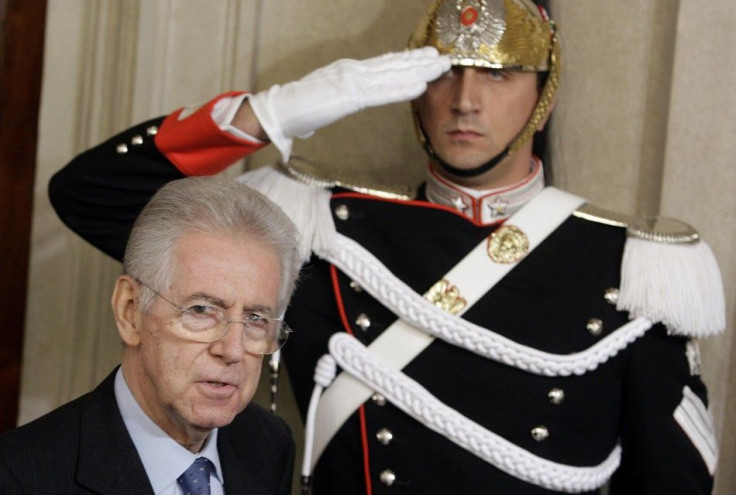Monti Introduces New ‘Technocratic’ Italian Cabinet

Mario Monti, the unelected new Prime Minister of Italy, has introduced his technocratic cabinet which will be burdened with the duty of alleviating the country’s massive debt crisis.
Among other things, he has named Corrado Passera, chief executive of the Intesa Sanpaolo banking group, as head the new super-ministry of development, infrastructure and transport. He also appointed Antonio Catricala, currently the head of the anti-trust authority, as deputy prime minister.
Monti named himself the economic and finance minister.
The newspaper Corriere Della Serra described the new cabinet as being composed only of experts, no politicians.
The yield on Italian 10-year sovereign bonds, which rose above the dangerous 7 percent level earlier this week, has now eased below that mark as a result of bond-buying by the European Central Bank (ECB),.
“We have received a lot of encouragement from our European partners and international authorities,” Monti said at a press conference at the Quirinale Palace in Rome.
“I hope this translates into a calming of the markets, especially regarding the tensions facing our country.”
Still Monti, a former European Union (EU) commissioner, faces an uphill battle to assure the markets that Rome will tackle its debt woes by making necessary sacrifices. The country’s debt load amounts to some 1.9 trillion euros ($2.6 trillion), or about 120 percent GDP, amidst a backdrop of tepid economic growth.
David Willey, a BBC correspondent in Rome, commented: “Italy's new prime minister's decision not to include members of the country's current political ruling class in his cabinet of ‘technocrats’ is the key to understanding his tactics in trying to restore credibility to the country in international financial markets. There had been widespread speculation during Mario Monti's consultations with the former political leadership that he would appoint Gianni Letta, Silvio Berlusconi's right-hand man for many years, as cabinet secretary for reasons of continuity. But in the end Mr. Letta and also Giuliano Amato, a former ‘technocrat’ prime minister, were absent from his list of ministers.”
Monti himself stated: “The lack of presence of political personalities in the government will help rather than obstruct the action of the government because it will remove any possible embarrassment.”
Annalisa Piazza, a London-based economist at Newedge Strategy, praised the make-up of the new cabinet.
A majority of names are academics with undeniable experience in their respective sectors, she told Reuters. “I think that the choice of Passera... is important considering the crisis originated in the financial sector.
Riccardo Barbieri, an economist at Mizuho, told Reuters: The cabinet is made up partly of people Monti knows well and trusts and partly of people who have probably been suggested to him by President [Giorgio] Napolitano as being credible... It's interesting that Monti has kept the economy ministry for himself. He obviously wants to be in control of what is clearly the most critical area.
However, Barbieri added: The only question for Italy is: 'Is it too late?'
While Monti has the support of most of Italy’s principal political parties the right-wing Northern League said it will not endorse him, raising fears that he will be unable to enact tough austerity measures, including tax hikes, job cuts and sales of state assets.
Alessandro Giansanti, a senior interest-rate strategist at ING Groep NV in Amsterdam, told Bloomberg: “It will be a difficult problem for [Monti] because he has no majority in parliament, and the cabinet will be made up of technocratic people. It’s not going to be an easy life for him.”
© Copyright IBTimes 2024. All rights reserved.




















